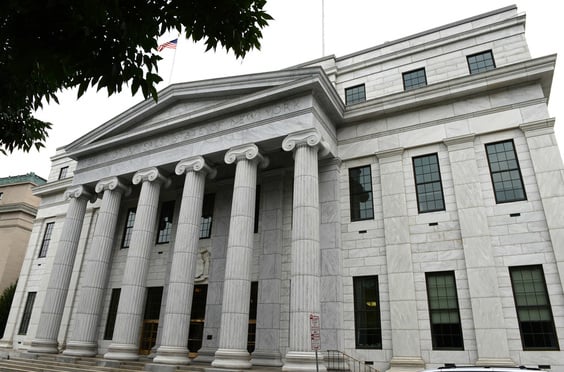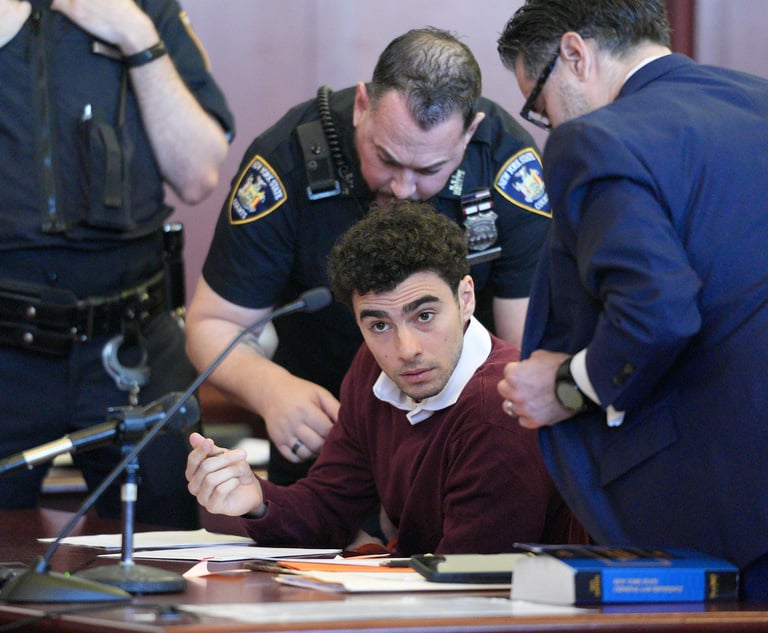Judge Should Not Have Determined Appeal of His Own Decision: Top NY Court
A Schenectady County Court judge should have recused himself from an appeal taken from his own previous decision, the state's Court of Appeals ruled Tuesday.
October 24, 2017 at 01:34 PM
7 minute read
 New York Court of Appeals building. Photo by Rick Kopstein
New York Court of Appeals building. Photo by Rick Kopstein A Schenectady County Court judge should not have determined an appeal of his own previous decision, the state's Court of Appeals ruled Tuesday.
After Schenectady County Court Judge Matthew Sypniewski was elected to the position in November 2014, he was assigned an appeal for which he had found the defendant, Brian Novak, guilty of all charges when he served as a Schenectady City Court judge. In his capacity as a county court judge, Sypniewski affirmed Novak's conviction.
In an opinion written by Associate Judge Paul Feinman, the state's highest court ruled that it's a violation of due process when the “sole judge deciding a criminal defendant's appeal as of right is the same judge who also presided over defendant's pretrial motions and bench trial” and that Sypniewski should have recused himself from the case.
“In this case, the same judge ruled upon defendant's pretrial motions, served as the trier of fact, convicted defendant, sentenced defendant, and then proceeded to serve as the sole reviewing judge on the appeal. On these facts, there was a clear abrogation of our state's court structure that guarantees one level of independent factual review as of right. Here, there was a facial appearance of impropriety,” Feinman wrote in the opinion.
In August 2012, Novak was arraigned in Schenectady City Court on a misdemeanor charge of driving while intoxicated and related traffic infractions. The following year, the Schenectady County District Attorney's Office filed a superseding prosecutor's information charging Novak with the lesser offense of driving while ability-impaired. Novak proceeded to a bench trial before then-City Court Judge Sypniewski, who found him guilty on all charges.
Novak, a Schenectady resident, appealed his conviction to the county court, which was assigned to Sypniewski once he was elected to the position.
Tracey Brunecz, an assistant district attorney for Schenectady County, argued before the court in September that the situation did not require a mandatory recusal by Sypniewski (NYLJ Sept. 6). Brunecz did not return a request for comment.
In the opinion, Feinman wrote that the People's argument in the case “misses the mark.”
“In any case, while there currently exists no explicit statutory or constitutional provision in New York prohibiting judges from reviewing their own judgment on appeals, our laws and court rules have long sought to purge actual bias and the possibility of bias from our courtroom,” the opinion said.
The appeals court further stated “under principles of due process … a judge may not act as appellate decision-maker in a case of which the judge previously presided at trial.”
“Although there was no evidence of partiality here, due process must still safeguard the appearance of impartiality to promote public confidence in the courts,” Feinman later added, reversing the county court's order affirming the conviction and remitting the back case to county court in Schenectady for the appeal to be heard by a different judge.
Danielle Neroni Reilly, Novak's attorney, did not immediately respond to requests for comment.
Chief Judge Janet DiFiore and Associate Judges Jenny Rivera, Leslie Stein, Eugene Fahey, Michael Garcia and Rowan Wilson concurred in the opinion written by Feinman.

A Schenectady County Court judge should not have determined an appeal of his own previous decision, the state's Court of Appeals ruled Tuesday.
After Schenectady County Court Judge Matthew Sypniewski was elected to the position in November 2014, he was assigned an appeal for which he had found the defendant, Brian Novak, guilty of all charges when he served as a Schenectady City Court judge. In his capacity as a county court judge, Sypniewski affirmed Novak's conviction.
In an opinion written by Associate Judge Paul Feinman, the state's highest court ruled that it's a violation of due process when the “sole judge deciding a criminal defendant's appeal as of right is the same judge who also presided over defendant's pretrial motions and bench trial” and that Sypniewski should have recused himself from the case.
“In this case, the same judge ruled upon defendant's pretrial motions, served as the trier of fact, convicted defendant, sentenced defendant, and then proceeded to serve as the sole reviewing judge on the appeal. On these facts, there was a clear abrogation of our state's court structure that guarantees one level of independent factual review as of right. Here, there was a facial appearance of impropriety,” Feinman wrote in the opinion.
In August 2012, Novak was arraigned in Schenectady City Court on a misdemeanor charge of driving while intoxicated and related traffic infractions. The following year, the Schenectady County District Attorney's Office filed a superseding prosecutor's information charging Novak with the lesser offense of driving while ability-impaired. Novak proceeded to a bench trial before then-City Court Judge Sypniewski, who found him guilty on all charges.
Novak, a Schenectady resident, appealed his conviction to the county court, which was assigned to Sypniewski once he was elected to the position.
Tracey Brunecz, an assistant district attorney for Schenectady County, argued before the court in September that the situation did not require a mandatory recusal by Sypniewski (NYLJ Sept. 6). Brunecz did not return a request for comment.
In the opinion, Feinman wrote that the People's argument in the case “misses the mark.”
“In any case, while there currently exists no explicit statutory or constitutional provision in
The appeals court further stated “under principles of due process … a judge may not act as appellate decision-maker in a case of which the judge previously presided at trial.”
“Although there was no evidence of partiality here, due process must still safeguard the appearance of impartiality to promote public confidence in the courts,” Feinman later added, reversing the county court's order affirming the conviction and remitting the back case to county court in Schenectady for the appeal to be heard by a different judge.
Danielle Neroni Reilly, Novak's attorney, did not immediately respond to requests for comment.
Chief Judge Janet DiFiore and Associate Judges
This content has been archived. It is available through our partners, LexisNexis® and Bloomberg Law.
To view this content, please continue to their sites.
Not a Lexis Subscriber?
Subscribe Now
Not a Bloomberg Law Subscriber?
Subscribe Now
NOT FOR REPRINT
© 2025 ALM Global, LLC, All Rights Reserved. Request academic re-use from www.copyright.com. All other uses, submit a request to [email protected]. For more information visit Asset & Logo Licensing.
You Might Like
View All

Luigi Mangione Defense Attorney Says NYC Mayor’s Comments on Case Raise Fair Trial Concerns
4 minute read
TikTok’s ‘Blackout Challenge’ Confronts the Limits of CDA Section 230 Immunity
6 minute readTrending Stories
- 1'It's Not Going to Be Pretty': PayPal, Capital One Face Novel Class Actions Over 'Poaching' Commissions Owed Influencers
- 211th Circuit Rejects Trump's Emergency Request as DOJ Prepares to Release Special Counsel's Final Report
- 3Supreme Court Takes Up Challenge to ACA Task Force
- 4'Tragedy of Unspeakable Proportions:' Could Edison, DWP, Face Lawsuits Over LA Wildfires?
- 5Meta Pulls Plug on DEI Programs
Who Got The Work
Michael G. Bongiorno, Andrew Scott Dulberg and Elizabeth E. Driscoll from Wilmer Cutler Pickering Hale and Dorr have stepped in to represent Symbotic Inc., an A.I.-enabled technology platform that focuses on increasing supply chain efficiency, and other defendants in a pending shareholder derivative lawsuit. The case, filed Oct. 2 in Massachusetts District Court by the Brown Law Firm on behalf of Stephen Austen, accuses certain officers and directors of misleading investors in regard to Symbotic's potential for margin growth by failing to disclose that the company was not equipped to timely deploy its systems or manage expenses through project delays. The case, assigned to U.S. District Judge Nathaniel M. Gorton, is 1:24-cv-12522, Austen v. Cohen et al.
Who Got The Work
Edmund Polubinski and Marie Killmond of Davis Polk & Wardwell have entered appearances for data platform software development company MongoDB and other defendants in a pending shareholder derivative lawsuit. The action, filed Oct. 7 in New York Southern District Court by the Brown Law Firm, accuses the company's directors and/or officers of falsely expressing confidence in the company’s restructuring of its sales incentive plan and downplaying the severity of decreases in its upfront commitments. The case is 1:24-cv-07594, Roy v. Ittycheria et al.
Who Got The Work
Amy O. Bruchs and Kurt F. Ellison of Michael Best & Friedrich have entered appearances for Epic Systems Corp. in a pending employment discrimination lawsuit. The suit was filed Sept. 7 in Wisconsin Western District Court by Levine Eisberner LLC and Siri & Glimstad on behalf of a project manager who claims that he was wrongfully terminated after applying for a religious exemption to the defendant's COVID-19 vaccine mandate. The case, assigned to U.S. Magistrate Judge Anita Marie Boor, is 3:24-cv-00630, Secker, Nathan v. Epic Systems Corporation.
Who Got The Work
David X. Sullivan, Thomas J. Finn and Gregory A. Hall from McCarter & English have entered appearances for Sunrun Installation Services in a pending civil rights lawsuit. The complaint was filed Sept. 4 in Connecticut District Court by attorney Robert M. Berke on behalf of former employee George Edward Steins, who was arrested and charged with employing an unregistered home improvement salesperson. The complaint alleges that had Sunrun informed the Connecticut Department of Consumer Protection that the plaintiff's employment had ended in 2017 and that he no longer held Sunrun's home improvement contractor license, he would not have been hit with charges, which were dismissed in May 2024. The case, assigned to U.S. District Judge Jeffrey A. Meyer, is 3:24-cv-01423, Steins v. Sunrun, Inc. et al.
Who Got The Work
Greenberg Traurig shareholder Joshua L. Raskin has entered an appearance for boohoo.com UK Ltd. in a pending patent infringement lawsuit. The suit, filed Sept. 3 in Texas Eastern District Court by Rozier Hardt McDonough on behalf of Alto Dynamics, asserts five patents related to an online shopping platform. The case, assigned to U.S. District Judge Rodney Gilstrap, is 2:24-cv-00719, Alto Dynamics, LLC v. boohoo.com UK Limited.
Featured Firms
Law Offices of Gary Martin Hays & Associates, P.C.
(470) 294-1674
Law Offices of Mark E. Salomone
(857) 444-6468
Smith & Hassler
(713) 739-1250







